Thoughts for Tomorrow
Artificial Intelligence and Real Stupidity.
AI's ability to analyze and detect complex patterns in massive data sources is expected to bring new tools for the good of humanity. Examples applied to climate change and environmental issues include efficient monitoring of indicators such as CO2 concentration in the atmosphere, changes in the mass of glaciers, rising sea levels, methane emissions and deforestation. Activities such as the design of energy-efficient buildings and the efficient use of renewable energy can also benefit.
Activities such as the design of energy-efficient buildings and the efficient use of renewable energy can also benefit.
All well and good but apart from its huge demands for energy, careless development of AI could be disastrous. AI is already used to generate videos that create realistic but fake images of celebrities falsely advertising products. There may be worse to come. For example, how, if at all, should AI bring persons, 'back from the dead'? Seeing a realistic Elvis in new performances could be harmless enough entertainment but what if future developments make realistic face-to-face interactions with an apparently real Elvis possible? Also, the ability to create as many new episodes as you like of your favorite television programs is evidently a fascinating possibility for the future.
But fascination can be dangerous if large numbers of individuals become obsessed and isolated in unreal worlds of their own making and are also at the mercy of those seeking to broadcast disinformation about climate and political issues in ways that AI could make more and more convincing. Isn't isolation from reality the very opposite of what's needed to face the climate emergency? No easy answers but free and unregulated Artificial Intelligence is Real Stupidity!
EcoBud
How should we Live?
Not a few of us, right now, are dealing with hurricanes, flooding, forest fires and other potential disasters made more likely by the changing climate. Confronting these threats in the short term is bad enough but what of the future? Current efforts to reduce CO2 emissions can slow down and hopefully arrest further global warming but climate changes already on the way are here to stay and climate scientists have recently predicted warming of at least 2.5C this century, with disastrous results for humanity.
At the very least, for the sake of the young and future generations, let's think long term and actually replace whatever unsustainable lifestyles led to the climate emergency in the first place.
No easy solutions but living in smaller self-sufficient communities where everyone can meet most of their daily needs within a short walk or bike ride is an attractive ideal and has been implemented in several cities such as Paris. There's less need to travel, greatly limiting the use of energy guzzling vehicles including electric ones. As for air travel, although 1% of the population in their private jets are responsible for half the world's aviation emissions the other 99% are collectively guilty too! Perhaps greater and better use of communication technology such as virtual reality could help to reduce travel needs?
It's easy to speculate but long term plans and actions should be carefully considered and acted upon, sooner rather than later. If not, it could be too late for our wonderful planet and the inseparable part of it named 'humanity'!
EcoBud
Challenging Misinformation
Misinformation about climate change persists and often goes unchallenged. Unfortunately, when the clear findings of expert climatologists are disputed it can be difficult to challenge misinformation without the necessary expertise. Also, when politely drawing attention to misinformation, it's very discouraging to be subject to abuse and the absence of civilized debate!
 Long threads of misleading comments and negativity in social media and websites slows understanding of climate change as an emergency requiring immediate urgent action. But what can be done short of attacking the right to free speech?
Long threads of misleading comments and negativity in social media and websites slows understanding of climate change as an emergency requiring immediate urgent action. But what can be done short of attacking the right to free speech?
Here's a suggestion. Scatter brief comments that gently point to good information among the bad. Not comments inviting debate and engagement but simple, short, relevant and diplomatically worded statements of fact. Hopefully, long threads of negative comments and misinformation would then become more positive by the tactful insertion of helpful notes. For example .....
@igotit 2 wks ago
great to hear ppl expos the climate change hoax
@inoitall 2 wks ago
yea anybody knows weather gos up and down a lot so wot?
@EcoHelp 2 wks ago
Pleased to help - weather is about how the atmosphere changes from day to day but climate is weather averaged over a long period of time. Sad to say, changes in climate are harming the planet - and us!
@igotit 2 wks ago
Hmm .....
If done on a large organized scale could this not help reduce the influence of misinformation? Crazy idea or not? Any thoughts?
EcoBud
WASTE!
My battery-operated hedge cutter came with an instruction manual of about 300 pages. OK, detailed instructions? Not at all - I tore out the one single page in English and recycled the rest!Imagine the waste generated all over the world by purchases of this hedge cutter as each buyer discards every page not in their own language. Imagine the energy needed to deliver these unnecessarily heavy manuals, the trees felled to make it possible and the admin costs of organising scores of translations, probably directed from a single country. It's an obvious example of waste but created in ways that can be difficult to assess because of our reliance on complex transport and communications systems.
Is waste unavoidable? Just take a look at Nature. Here's an extremely complex system of systems where recycling is the norm and nothing goes to waste. For us, production and consumption may be necessary but can't we learn to restrain our activities without exploiting natural resources so that the entire planet with all its lifeforms, including ourselves, is threatened by our wasting ways?
EcoBud
Electrification is the name
of the game?
 Apparently, Volvo claims that emissions while constructing an electric vehicle can be 70% higher in comparison with vehicles driven by fossil fuel! The heavy lithium-ion batteries currently used by electric cars are energy-intensive in manufacture and also depend on rare earth metals with environmental and social problems caused by mining. Technological solutions are hardly on the horizon so the situation can only worsen as more and more people gradually replace their old vehicles with electric ones, using batteries with difficult disposable problems.
Apparently, Volvo claims that emissions while constructing an electric vehicle can be 70% higher in comparison with vehicles driven by fossil fuel! The heavy lithium-ion batteries currently used by electric cars are energy-intensive in manufacture and also depend on rare earth metals with environmental and social problems caused by mining. Technological solutions are hardly on the horizon so the situation can only worsen as more and more people gradually replace their old vehicles with electric ones, using batteries with difficult disposable problems.
What can be done right now? Well, for a start, we could simply hold on to our fossil fuel vehicles but drive them less. Also, let's have some restraint on the sales culture that says you have to have a new vehicle every 3 years or so. In the long term, do we really need so many individual vehicles? Could we not make more use of public transport or cycling or even walking? Are all the highways and byways really necessary in view of the environmental problems they cause by their continual construction and maintenance? What do you think?
EcoBud
Lost in the Jungle
After 40 days in the Amazon jungle the child survivors of the plane crash were found. The western expertise and technology practiced by  the regular soldiers along with the jungle knowhow and ancestral knowledge of indigenous helpers, led to a successful rescue. Fortunately, the children were also indigenous and the oldest, following the wisdom of her grandmother, knew how to find edible fruits and water.
the regular soldiers along with the jungle knowhow and ancestral knowledge of indigenous helpers, led to a successful rescue. Fortunately, the children were also indigenous and the oldest, following the wisdom of her grandmother, knew how to find edible fruits and water.
This first hand example of cooperation is very clear and caused some of the soldiers to change their thoughts about Colombia's indigenous peoples. Unfortunately, ideas about 'primitive' lifestyles, 'savages' etc, handed down in western cultures are difficult to change although it's accepted by the UN and many others that the practices and traditions of indigenous peoples are important for today's social and ecological problems. For example, would modern agriculture, with its pollution and biodiversity loss, not benefit from the more sustainable practices of indigenous peoples? Respect the bonds connecting all people with the Earth and all other lifeforms?
There are many other examples of potential benefit arising from indigenous lifestyles such as respect for the wisdom of elders and real concern for unborn generations. You don't have to live in a cave or hunt with bows and arrows! Find out what's relevant for you and your community and you may be surprised.
So - I haven't thrown away my SatNav but I'll be following the sun too!
EcoBud
Be The Change!
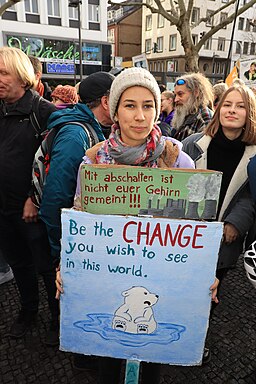 This ought to concentrate minds but those in power are slow to take radical collective action. So it now seems likely that global warming will continue to rise causing progressively greater disruption for all life. Expect massive migrations away from threatened areas, failures in food supply and distribution and if warming becomes really extreme, societal breakdown and even mass extinction becomes a real possibility.
This ought to concentrate minds but those in power are slow to take radical collective action. So it now seems likely that global warming will continue to rise causing progressively greater disruption for all life. Expect massive migrations away from threatened areas, failures in food supply and distribution and if warming becomes really extreme, societal breakdown and even mass extinction becomes a real possibility.
All doom and gloom then? I don't think so. 'Business as usual' is not an option and lifestyle changes will be necessary but however drastic they turn out to be the opportunity is always there to lessen negative impacts for the greater good. In the absence of leadership by the powers that be massive action at a grassroots level can make a real difference. Plenty information is available about what anyone can do according to their abilities and personal circumstances.
Also, be aware that responding well to climate and environmental issues and working effectively towards solutions is driven more by emotion rather than intellect. Think of your children, grandchildren and future generations. Cultivate climate wisdom in tune with your beliefs, be they religious, philosophical, political, whatever. Choose your path wisely and with humility.
Be the change you want to see in the world!
EcoBud
Drawbridges up or Down?
Business as Usual?Here, rolling back Green spending before elections. There, waging disinformation wars rather than turning off the oil wells. No problem, technological advances are on the way. Yes, fossil fuel emissions came down a little at first but then global warming was suddenly accelerated by thawing permafrost in the Arctic. This was the first of a cascade of tipping points causing irreversible climate damage, environmental changes and devastation never seen before. Too late for most of the human population and the natural world but not for the affluent few with the vast resources needed to isolate and insulate their gated communities.
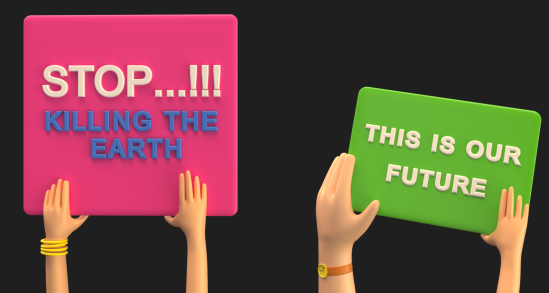 As warming exceeded the 3C mark, up came the drawbridges with no mercy for those left outside ......
As warming exceeded the 3C mark, up came the drawbridges with no mercy for those left outside ......
New Age?
Following a regime change, massive deforestation recontinued in the Amazon triggering popular uprisings around the world that no politician could ignore. A hastily convened international conference actually achieved majority agreement and a large UN rescue mission was funded and assembled to enforce it. Many countries adopted wartime-like measures to rein in emissions and protect the most vulnerable from the harshest lifestyle changes. Some reluctant countries, faced with invasion, finally agreed to necessary measures and funding was made available. Emissions rapidly dwindled to zero and a new era for humanity was forged ......
Extreme scenarios and speculative detail? - no doubt! So do we just muddle through in some middle way and pay the price or is there real hope for humanity?
EcoBud
The Reality of Travel
Limited travel, particularly international travel, will place demands on the Internet that current services don't usually provide. For example, consider simulating face-to-face meetings with loved ones in a remote country. Video and sound is readily available with a 2D screen but there's little perception of actually being together in the same intimate space.
The 'metaverse' is a 3D, virtual world, an internet space based on Virtual Reality (VR). Billions are being spent on this unreal world as resources in the real world dwindle and sadly, the current focus is on economic growth.  But VR has the potential to play a positive role in the real world to come. Despite the clunky headsets the perception of being somewhere else with other people, immersed in a 3D, 360 degree environment, can be very convincing. But could VR transmit that special hug for your mother in a realistic way? Well, haptic technology can even provide some degree of touch and feel.
But VR has the potential to play a positive role in the real world to come. Despite the clunky headsets the perception of being somewhere else with other people, immersed in a 3D, 360 degree environment, can be very convincing. But could VR transmit that special hug for your mother in a realistic way? Well, haptic technology can even provide some degree of touch and feel.
Other ways that VR can effectively replace the need for real world travel include:
Empathy building - Interact with others more directly affected by climate emergencies.
Education - Kids take lessons together in the same virtual classroom.
Medical - Detailed examinations by remote doctors in the privacy of virtual surgeries.
These approaches and others may rely on advanced VR features not yet in common use but improvements in technology are likely to reduce costs. Let's keep the virtual world but only in the service of the real one!
EcoBud
Get ready for tomorrow.
"Be The Change!" I trumpet when writing about the lifestyle changes that climate change will bring. Evidently most people are now becoming concerned about climate but what can individuals do - or not do? That is the question. Perhaps the '4 Rs' might help.
- Resilience: What of value do we want to keep?
- Relinquishment: What will it help to lose?
- Restoration: What benefits can be restored from the past?
- Reconciliation: What of morality? How to make peace with the planet - and each other!
 There are many possibilities for community action and many activist groups to join and support. There's imaginative projects such as the collection and charitable distribution of food and other materials from shops and businesses that would otherwise go to waste.
There are many possibilities for community action and many activist groups to join and support. There's imaginative projects such as the collection and charitable distribution of food and other materials from shops and businesses that would otherwise go to waste.
What can you do personally? Go vegan or vegetarian, fine, but no need to be perfectionist and disrespect those who enjoy the occasional beef sandwich! What about direct action and civil disobedience? Plenty to consider there but the balance might lie in doing small things well rather than risk doing big things badly. Influence others by making your views and concerns known to local politicians, community leaders and anyone else. Demand change by all means but better still, "Be the Change" yourself!
EcoBud
Writing on the Wall
Our modern societies depend on a complicated mix of interacting systems that we expect to change slowly and predictably for the better and it may not be very obvious when things gradually become worse.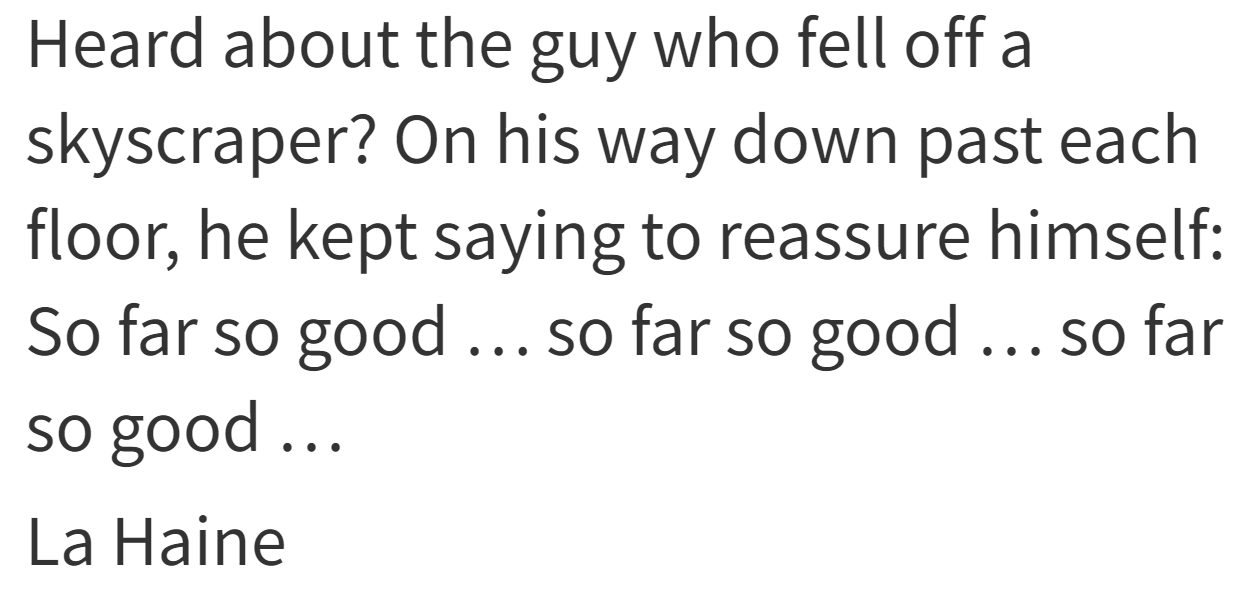 It's also true that sudden system failures in one country, such as a financial crisis, can have disastrous global consequences. Climate change now produces increasing numbers of sudden and potentially catastrophic threats and more are likely. Extreme weather causing sudden crop failures followed by widespread economic disruption and migration issues, is just one example.
It's also true that sudden system failures in one country, such as a financial crisis, can have disastrous global consequences. Climate change now produces increasing numbers of sudden and potentially catastrophic threats and more are likely. Extreme weather causing sudden crop failures followed by widespread economic disruption and migration issues, is just one example.
Are we properly equipped to deal with the urgency and complexity of climate change? I think not. Real power is held by politicians whose natural focus is on short-termism and the next election. International corporations are largely motivated by profit and have the power and influence to aggressively promote their businesses, almost regardless of the greater good. The fossil fuel industries are prime examples.
Yes, we can hope for the best while preparing for the worst as we dig our vegetable gardens but don't we now have a golden opportunity to reconsider the very fundamentals on which our currently unsustainable societies are based? Must institutions be set up to compete and divide rather than cooperate, to accumulate wealth rather than share it wisely and to viciously exploit rather than conserve the planet's resources? Let's look to ourselves for a change of hearts and minds. The writing is on the wall - we should do something about it!
EcoBud
Denial
Everyone knows and talks about climate change now but not in terms of climate breakdown. Why is this? The scientific evidence for breakdown is clear and the effects are now present for all to see in extreme weather events etc etc.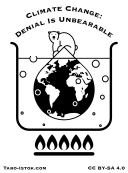 This mother of all emergencies affects the entire future of the planet, including humanity, but so far there's been little urgent action and many people, who might not deny the science, still don't recognize the urgency. Isn't that a form of denial too?
This mother of all emergencies affects the entire future of the planet, including humanity, but so far there's been little urgent action and many people, who might not deny the science, still don't recognize the urgency. Isn't that a form of denial too?
Oil and gas companies have known that burning oil and gas could cause climate change and global warming for many many years. They, and other vested interests, have persistently funded climate change denial by attempting to influence public opinion. They misrepresent climate change science by creating doubt and manipulating debate. Even now, COP28, which should be pushing for drastic reductions in global emissions, was effectively taken over in an oil-rich country, by scores of lobbyists whose aim is to delay, weaken or block policies that actually tackle climate change.
The lobbyists might be played at their own game . People could be nudged away away from shades of climate denial, rather like they were nudged away from smoking cigarettes in the past by officially funded campaigns. Would aggressive advertising of the positive aspects of climate change work? For example, farmers are more likely to be positive about change if they experience improved production from climate-friendly practices. But where are the official funds now?
EcoBud
Message from Gaia
Sorting out some old text files I came across a message from somebody called Gaia.
"I have had enough. I have given, given, given and I have been plundered, raped, stolen from, dismissed, ignored, had poisonous nuclear waste dumped in perishable containers deep in my belly.  I have had all your refuse and toxic waste thrown into my pristine oceans, killing off my friends the fish and marine life whose home this is. My forests have been decimated for your consumer lifestyles. My ice caps destroyed by your obsession with getting more. For what purpose? I have had enough.
I have had all your refuse and toxic waste thrown into my pristine oceans, killing off my friends the fish and marine life whose home this is. My forests have been decimated for your consumer lifestyles. My ice caps destroyed by your obsession with getting more. For what purpose? I have had enough.
I radiate love, but this strange species that calls itself humanity and thinks it is above everything else, is the only species that has lost its roots and so lost its way that it has suffocated me and mine, and is now suffocating itself! This is not revenge, I am doing this out of love for the whole. Only as humanity suffocates in its own greed, contempt, ignorance and arrogance will it start to change its ways. Pass this message on to all who will hear. Thank you."
Well now, that's an alarming thought for tomorrow - and today! Let's face it. The cause of climate change is simply the blind pursuit of economic growth that followed our Industrial Revolution. But humans are part of the natural world so how can we shift growth to genuine human and planetary wellbeing? Now that we're all aware of the damage climate change is causing to the planet isn't it time to take stock and rethink?
EcoBud
Robert Burns on Nature and Humanity
Enjoying my whisky and haggis on Burns Day it occurred to me that Robert Burns had much to say that's very relevant to today's troubles. His work is appreciated everywhere yet his thoughts on human behaviour and nature are still at odds with many current attitudes.Ploughing his fields he accidentally overturns a mouse's nest, needed for its survival over the winter. He's said to have composed "To a Mouse" while holding his plough.
 "Little, sleek, cowering, timorous beast
"Little, sleek, cowering, timorous beast
Oh, what a panic is in your breast!
You need not start away so hasty
With bickering prattle!
I would be loath to run and chase you,
With murdering paddle!"
(Scots to English translations via Wikipedia)
Just imagine - he stops work to sympathise with a minute fellow creature, probably regarded as a pest and chased or even killed by other farmers. Burns was never a successful farmer and he was living in poverty. Ploughing was absolutely crucial for his own survival yet his heartfelt feeling for the survival of natural life concerned him very deeply.
He reflects on the broken bonds between nature and humanity:
I'm truly sorry man's dominion
Has broken Nature's social union,
And justifies that ill opinion
Which makes you startle
At me, your poor, earth-born companion
And fellow mortal!
And in our own day, facing thoughtless exploitation of what's considered to be 'natural resources', will Nature's social union with humanity remain broken? I'm no doomster but I'm with Burns when he ends:
"And forward, though I can't see, I guess and fear!"
EcoBud
Is Education Climate Ready?
Kids are being educated for an imaginary world that just doesn't exist any more. If education is supposed to equip people, especially children, with the tools for happy and productive lives then we need a major rethink. We are very well educated for unsustainable, competitive lifestyles that gobble up the planet's resources. Our education is directed towards employability and high salary jobs but what of plans for the future?Climate change is likely to alter political, economic, social, health, transportation and technological systems in many different ways, including extreme failure. When, how and to what extent is not clear so education is absolutely necessary to prepare our children and grandchildren for the lifestyle changes that are already affecting many of us for the first time.
Basic know-how is likely to become more useful rather than knowledge in the traditional academic sense. Skills that could be vital in emergencies 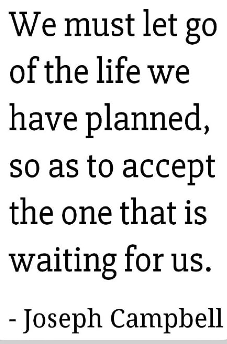 include cooking, making and lighting fires, planting, sewing, mending, community-building, medical knowledge and caring for others. All these could be gently introduced to children from a very young age.
include cooking, making and lighting fires, planting, sewing, mending, community-building, medical knowledge and caring for others. All these could be gently introduced to children from a very young age.
On a more academic level, universities and colleges should present climate science and it's implications in beneficial terms. They all have an important part to play in their research and courses, questioning assumptions, counteracting disinformation and offering convincing and acceptable plans for the future. We all have plans for the future but as Mike Tyson remarked, "Everyone has a plan 'till they get punched in the mouth!"
EcoBud
Thoughts for Tomorrow
Consumerism on Ice
Apparently a New York bar imports ice from Japan, 6000 miles away! Somehow, via social media, clever ads or whatever, a pointless demand has been created, regardless of wider considerations such as waste or carbon footprint. Unfortunately, people can be persuaded and tricked into needless consumption that encourages waste, pollution and greed.
Rampant consumerism is unsustainable and definitely not wanted when it comes to tackling climate change and environmental issues.  But things could get much worse as AI (Artificial Intelligence) becomes widespread and enormous databases of personal information are created. For example, consider the promotion of some product, say small electric heaters. They may be inferior to other products already on the market but human promoters, using their know-how and expertise, will place ads, videos etc aimed at the types of users most likely to purchase their product.
But things could get much worse as AI (Artificial Intelligence) becomes widespread and enormous databases of personal information are created. For example, consider the promotion of some product, say small electric heaters. They may be inferior to other products already on the market but human promoters, using their know-how and expertise, will place ads, videos etc aimed at the types of users most likely to purchase their product.
Now AI, given terabytes of personal info, has the ability to go much further than human activity in perfectly targeting the promotion of a product at individuals. Very select groups of potential buyers can be formed from very comprehensive records of age, ethnicity, purchasing habits and even deep recorded knowledge about human behaviour. The target groups can then be bombarded, perhaps automatically, with whatever mix of information and misinformation is most likely to persuade them to buy.
Instead of promoting yet more consumerism, could properly regulated AI not be used to demonstrate the urgency of climate change and related issues? . . . . . or should that thought be put on (non-Japanese) ice?
(Ice cubes image via Wikimedia Commons)
EcoBud
When will they ever learn?
Well, at least the issues surrounding climate change and the planet have entered mainstream debate now, if only through persistent pressure by protestors. At the best, governments are slow to make the necessary commitments and then act on them. At the worst, they backtrack when they see public disapproval and electoral disadvantage. Terrified of promoting doom and gloom they shy away from boldly embracing the facts. For example .....
At the best, governments are slow to make the necessary commitments and then act on them. At the worst, they backtrack when they see public disapproval and electoral disadvantage. Terrified of promoting doom and gloom they shy away from boldly embracing the facts. For example .....
- Global Warming: the planet could be warmer by 1.5℃ since industrialisation and possibly 6℃ to 7℃ by the end of this century.
- Mass extinctions: Almost 60,000 species are lost each year. Of about a million species facing future extinction, half are insects with critical roles in ecosystems and food production.
- Acidic Oceans: Oceans have acidified by about 25% since the beginning of the industrial revolution and this could increase to 170% by 2100.
- Deforestation: There are about 50% fewer trees since the agricultural revolution.
But it's not all doom and gloom. Is it possible that the recent historic decision by the European Court of Human Rights (ECHR) on climate change and the right to respect for private and family life, can lift climate above party politics as governments strive to stay within international law?
EcoBud